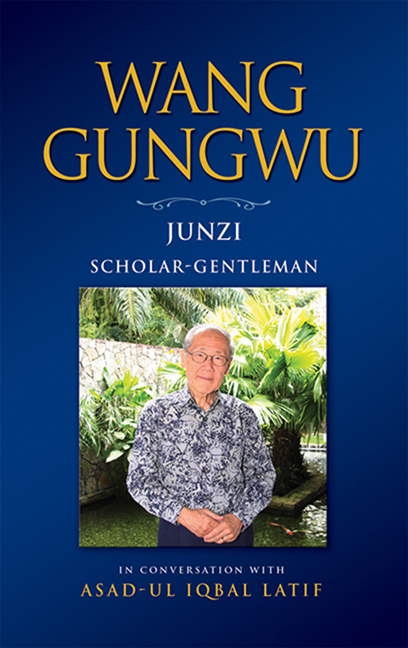Foreword
Published online by Cambridge University Press: 09 November 2017
Summary
Albert Einstein once said that if his theory of relativity were proved incorrect, French people would say I am a German, and Germans would say I am a Jew. If it were proved correct, Germans would say I am a German and the French would say I am a citizen of the world. It is a tribute to Wang Gungwu as a scholar, a teacher, an administrator, and as a generous human being that every place where he has lived not only claims him but tried to attract him to stay and work there: Malaysia, England, the United States, Australia, Hong Kong, Singapore. It is also a tribute to his broad-ranging intellect that he is completely comfortable in the scholarship and cultures in the West, in China, and in Southeast Asia. It is also a tribute to the support of his wife Margaret who shares his comfort in East and West and bears his dedication to scholarship with gentle humour, understanding, and a perky optimism.
Some marginal men who span different cultures have deep psychological wounds and never feel a part of any culture. Gungwu somehow managed to sink deep roots in and feel part of many cultures, without the wounds. He had the good fortune to grow up in a gentle Chinese scholarly family as an only child speaking Mandarin and getting schooled by his schoolteacher father, especially during the Japanese occupation. Unlike his schoolmates in Ipoh, Malaya, Gungwu therefore grew up as an insider in China's “great tradition”. Before and after the Japanese occupation, Gungwu also became an insider in the British school system and later in the British higher education system at the University of Malaya and the London School of Oriental and African Studies. When he studied at Central University, Nanjing in 1947–48, he had an opportunity to be a part of a group of bright young people being trained to become academic and political leaders who, as it turned out, served both in the mainland and in Taiwan.
Gungwu's teacher at the University of Malaya, C. N. Parkinson, wrote that in bureaucracies “work expands so as to fill the time available”, but for Gungwu, his dedication to scholarship seemed to expand to cover all his time as he stretched from economics and Western literature to Southeast Asian history and two thousand years of Chinese history.
- Type
- Chapter
- Information
- Wang GungwuJunzi: Scholar-Gentleman in Conversation with Asad-ul Iqbal Latif, pp. vii - xiiPublisher: ISEAS–Yusof Ishak InstitutePrint publication year: 2010



